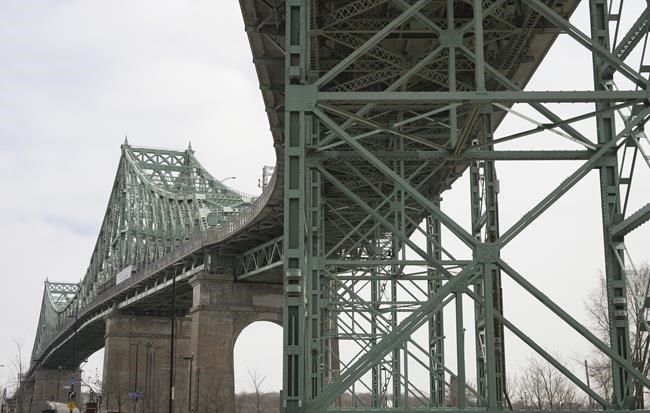MONTREAL — Canadian authorities tried to reassure the public about the safety of bridges in the country following the collapse of a bridge in Baltimore, Md., early Tuesday morning after it was rammed by a container ship.
Halifax Harbour Bridges, which operates the two spans across the harbour between Halifax and Dartmouth, said it has taken steps to mitigate the risks of collisions between ships and bridges. The Crown corporation says it is notified by the port authority every time a commercial vessel is scheduled to pass underneath the spans.
"Bridge patrol staff provide physical lookouts on the bridges as ships pass, and a complex series of cameras monitor and record the transit," the corporation said in a news release.
As well, rock islands built around the piers of the bridges in 1983 offer further protection, Halifax Harbour Bridges said.
Rock islands or other protective structures appear to have been missing from the piers of Francis Scott Key Bridge in Baltimore, said Bruno Massicotte, an engineering professor at Polytechnique Montréal.
The bridge was struck around 1:30 a.m. by a container ship that lost power and rammed into one of the piers, sending vehicles plunging into the water. Six people are missing and presumed dead.
Massicotte said he is surprised that the bridge's piers weren't protected to absorb the energy from a possible ship strike.
"When you have a bridge pier in the waterway, it has to be protected against ship impacts," Massicotte said in an interview Tuesday.
The easiest way to do that is to surround a pier with concrete, steel or rocks, which can all absorb the energy from a potential strike and block a vessel from hitting the bridge itself, he said. Canada's bridge code requires piers to be similarly protected if they are considered to be vulnerable to ship strikes.
"A bridge pier is not designed to resist that kind of impact, so that's why we put things in the water," he said.
Quebec's Transport Department, which is responsible for several bridges spanning the St. Lawrence River, said it has protected the piers of the only bridge under its jurisdiction that has been judged at risk of being struck by commercial ships.
That bridge, the Laviolette Bridge connecting Trois-Rivières, Que., to Bécancour, Que., is built from the same material as the span that collapsed in Baltimore, department spokesman Louis-André Bertrand said in an email.
In 1986, Bertrand said, the department conducted "massive" work to create protective islands around the bridge's piers.
"As a result, if a ship approaches one of the foundation units, it will be stopped by the granular material around the pier and will not be able to reach it," he wrote, adding that in 1992 a boat ran aground near the bridge without causing any damage to the structure.
Most other large bridges over the St. Lawrence River don't have piers located in shipping lanes, he said.
In British Columbia, the Ministry of Transportation and Infrastructure said plans are in the design stage to protect the Lions Gate Bridge and Ironworkers Memorial Bridge, both of which connect Vancouver to neighbouring suburbs, from ship collisions.
"We are enhancing the existing concrete collar at the base of the south tower of the Lions Gate Bridge with an in-water rock-fill berm," the ministry said in an emailed statement. "The north tower already has one. We will also be installing in-water deflection structures at the Ironworkers Memorial Bridge."
Elena Dragomirescu, an engineering professor at the University of Ottawa, said any bridge, regardless of its age, could collapse if it is struck by a large cargo ship. "Bridges need all the components to work together. If one of the components is damaged, or collapsed in this case, then the entire bridge is at risk," she said in an interview Tuesday.
But it is rare that bridges collapse because they are struck by ships, she said. Dragomirescu said she's more worried about the structural integrity of decaying spans across Canada that could come down because of poor maintenance — like in 2006 in Laval, Que., when a highway overpass collapsed and killed five people.
This report by The Canadian Press was first published March 26, 2024.
— With files from The Associated Press.
Jacob Serebrin, The Canadian Press




